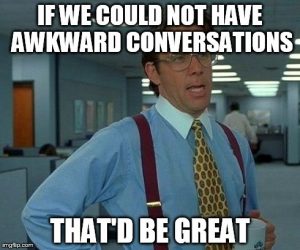So, now you’ve booked your interview, your subject is excited about it and they’re telling their friends to keep an eye out for it: what comes next?
There really is no one way to conduct an interview. You’ve likely read a thousand interviews in your life, so you know the basic question/answer format – but remember, the whole point of the interview is to really get to know the person to whom you’re speaking! This is a CONVERSATION first, and an interview second.
Ditch the Pen/Pad and Mic Up
With that in mind, throw away the pen and the pad! You’re not an ace reporter chasing a hot scoop, and unless you’re the world’s best multitasker, one part of your interview will dominate the other. Either you’ll spend a lot of time writing answers, which creates an awkward rhythm to the conversation, or you’ll get so immersed in the conversation, you’ll forget to take notes. Or, even worse, you’ll have an ok conversation with mediocre notes.
You have a phone. That phone has a microphone. USE IT. It’s a passable audio quality, but for the sake of your sanity moving forward you should invest in an external microphone which attaches via your phone’s USB port. They’re inexpensive and will make your life easier. Here’s a few solid options to look for.

How to Decide on Questions and Set the Tone for the Conversation For The Prospect Interview
It goes without saying that you should have questions prepared beforehand. As we discussed in the last article, some business owners may want the questions in advance to prepare. So, let’s discuss the questions you should ask.
The model you should follow comes from Dr. Marshall Ganz at Harvard University. It was repurposed by faculty at Toronto’s Ryerson University to become a community engagement/leadership tool for those seeking to make change in their communities (It’s also taught as a weekend course in downtown Toronto which anyone can sign up for, there will be course info at the end of the article if you’re local to Toronto).
The core of the curriculum – which focuses on relationship-building through storytelling – emphasizes the power of people’s stories in gaining support for their causes. It builds familiarity, rapport and most importantly, it builds trust and a meaningful connection.
But Gary Vee Said…
I know some of you are saying “But Gary Vee said nobody gives a shit about your story. Your story doesn’t matter.” Gary is a brilliant guy, but this is one instance where he’s got it completely wrong. Your story matters, their stories matter, and those stories are the foundation of a long and strong relationship.
The Flow
These are the key themes you want to touch on during your interview, and we’ll do a few examples to illustrate how you work it into the conversation while maintaining a conversation flow.
- Their pre-neighbourhood/pre-business life: “Where are you from originally?”, “Where did you go to school?”, “What were you doing before you opened your business?”
- Decision to open their own business: “What made you want to go into business for yourself?”, “How did you decide on the type of business you wanted to open?”
- The Neighbourhood: “What about the neighborhood attracted you?”, “What have you liked most about the neighborhood since being here?”, “Do you live in the neighborhood?”, “What other neighborhoods were you looking at, and what made you choose this over the others?”
- Their Business: “How long have you been open?”, “What do you think you’re best known for?”, “What’s your most popular item/service?”, “When are you busiest?”, “Do you have daily/weekly specials?”, “Any memorable moments?”
- The Future: “Are you planning on expanding?”, “Are you looking to hire more staff?”
- Conclusion: “Is there anything you’d like to say to your customers?”
Open-Ended Questions Are For Closers
For the sake of conversation, these themes are arranged in a logical flow to help you have a natural, more natural conversation. DO NOT ASK YES OR NO QUESTIONS. A conversation full of yes or no questions is best likened to driving by slamming on the brakes every few seconds. It’s awkward, jerky, impersonal, and doesn’t allow the conversation to flow organically. OPEN-ENDED QUESTIONS ONLY!

Breaking Bread to Break the Ice
The key is to put the person at ease so that they’re more candid and descriptive. Everybody eats; why not schedule an interview over breakfast or lunch? This is ideal because you can get the more dense information of their background out of the way while you wait for your food, and can spend the meal just chatting at the pace two friends would. If you go this route, aim to have the first three themes covered by the time your food shows up so the meal can be about their business, the future, neighborhood and they can share anything they’d like neighborhoods you part ways.
Just remember: Mind your manners!
The reason this works well is because it shows you literally putting your money where your mouth is, and putting money into their business (if it’s a restaurant owner), and the neighbourhood – plus you’ll score points for asking for them to recommend their favourite dishes on the menu (and you can rave about the food in the article!). If they don’t own a restaurant, ask them if they’ve got a favorite local eatery; with any luck, you could end up booking an interview with the owner of the eatery on the recommendation of the person you’re interviewing!
Let’s Wrap This Up & Get You Out There Interviewing
That’s a lot of info, so let’s condense this to the key points.
- Aim to have a great conversation with lots of open-ended questions so they can respond and express themselves.
- Record, don’t write, your notes during the conversation. It just helps things flow more naturally.
- Emphasize that you’re interested in their story first and foremost. Their story matters and is the heart of your article.
- Follow the logical flow outlined above, and get good at transitioning.
- Everybody eats, and there is a way you can have a great conversation during a meal, as well as show support for their business/the neighborhood. Works whether you interview a restaurant owner or a non-food business owner.
- HAVE FUN! This is a great opportunity to engage with the neighborhood. Enthusiasm shows you care.
There you have it! Use these tips and you’ll put people at ease, which is vital because the more comfortable they are, the better answers they’ll give. The better answers they give, the better your article will be, and the better the response will be when you both circulate it!






